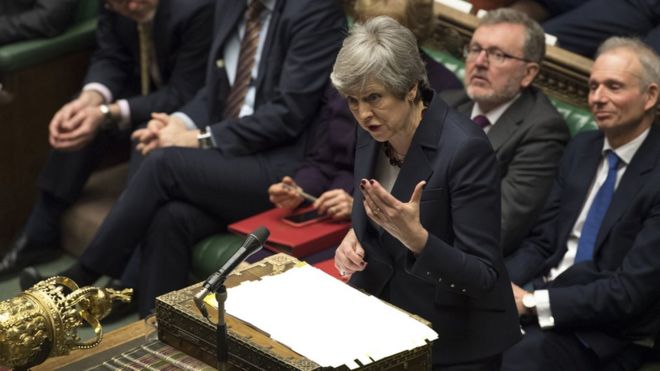The Brexit process remains in deadlock as MPs struggle to find a consensus on the next steps.
The Commons failed to find a majority for a way forward after voting for eight different options on Wednesday.
And while some senior Brexiteers have moved towards supporting Theresa May's deal, the MPs she relies on in the DUP have refused to alter their stance.
The PM won some support by saying she would resign ahead of the next round of EU negotiations if her deal passes.
This means she still may bring her plan back to the Commons this week for another vote - the so-called "meaningful vote three" - despite it already being defeated twice by large margins.
Mrs May's close ally and former deputy Damian Green told BBC Radio 4's Today programme that the prime minister will "take the path of soldiering on".
But although the prime minister has won over the likes of former foreign secretary Boris Johnson, a number of hardcore Brexiteers are still refusing to vote for the deal.
Former Brexit secretary Dominic Raab said he still believed it is still possible to get concessions from the EU on the deal, but if the bloc does not move, there should be "sensible conversations" around no-deal.
And the vice-chairman of the backbench European Research Group, Steve Baker, has suggested he may resign the Conservative whip rather than vote for the deal.
What happened last night?
MPs voted to seize power of the Commons on Wednesday and put forward a series of options to take Brexit forward - including leaving without a deal, creating a customs union and backing a confirmatory referendum on any deal.
But after several hours of debate, none of the eight options emerged as a front runner among MPs.
Conservative MP Sir Oliver Letwin, who oversaw the unprecedented process of "indicative votes", said the lack of a majority for any proposition was "disappointing".
But he told the Today programme no "assumptions" should be made about the outcome of further indicative votes, which he believes should take place on Monday if the PM's deal is not approved this week.
"It's very difficult to translate from how people vote the first time, when they don't know how other people are voting, to how they will vote when they can see how other people are voting under new circumstances," he said.
Ahead of Wednesday's debate, Mrs May told a meeting of Conservative backbenchers she would leave office earlier than planned if she won Parliament's backing for her withdrawal agreement with the EU.
Mrs May told her MPs: "I have heard very clearly the mood of the parliamentary party. I know there is a desire for a new approach - and new leadership - in the second phase of the Brexit negotiations - and I won't stand in the way of that."
She told MPs she would resign as party leader after 22 May - the new Brexit date - but stay on as PM until a new leader is elected. However, Downing Street said it would be a "different ball game" if the deal was not passed.
Read also: Brexit: Theresa May vows to stand down if deal is passed
Source: bbc





